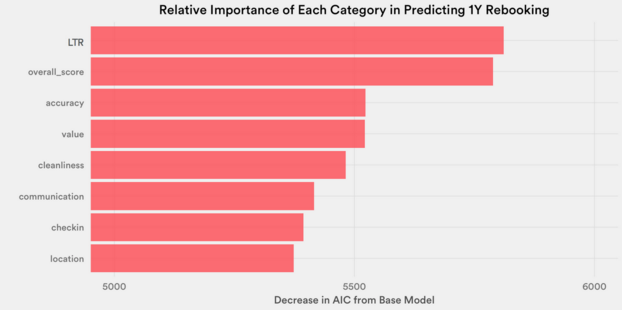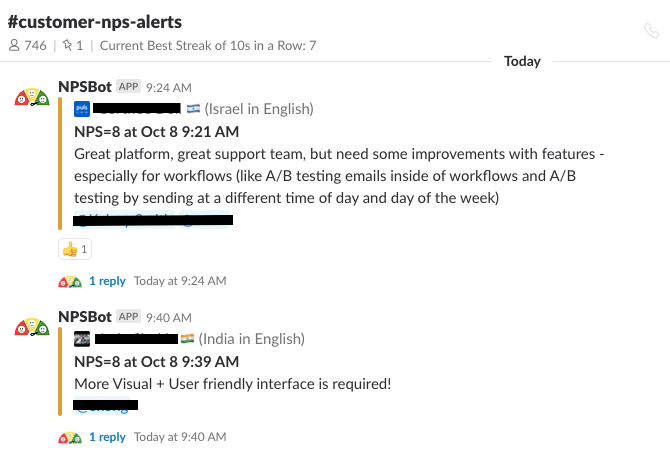Are you aware of the concept of Net Promoter Score (NPS)? It's a measure of customer loyalty used by many businesses to gauge customer satisfaction. This score is used to determine how customers perceive a company's products, services and overall brand experience.
Net Promoter Score (NPS) is a well-known customer loyalty metric that gives businesses an indication of how satisfied and loyal their customers are. Recommendations from friends and family and online reviews are incredibly valuable to your customers. In fact, 91% of people regularly or occasionally read online reviews, and 84% trust online reviews as much as a personal recommendation.
Take a moment to consider this. It means that even if your branding, blog posts, and email subject lines are all done right, you can still lose out on new customers due to one person's negative experience with your company. On top of that, unsatisfied customers usually talk about their experiences more often than happy customers – by nearly a 3X margin.
Net promoter score (NPS) is vital for businesses these days in order to understand their customers’ feedback, identify their weaknesses and strengths, and measure their overall performance among similar products/services in the industry.
In this article, we will discuss what NPS is, how it’s used, and its importance in measuring customer loyalty and satisfaction.
|
Net Promoter Score (NPS) NPS stands for Net Promoter Score. It's a customer satisfaction benchmark that measures how likely your customers are to recommend your business to a friend. |
What is Net Promoter Score (NPS)?
Net Promoter Score (NPS) is a widely used benchmark to measure customer satisfaction and loyalty. It is an indicator of how likely customers are to recommend your business to their friends and family. This score is important as it helps businesses to evaluate their performance and improve their customer experience.
NPS is different from other customer satisfaction benchmarks such as the customer satisfaction score or customer effort score. It measures a customer's overall sentiment about a brand, rather than their perception of a singular interaction or purchase. This makes it a valuable tool for businesses to get an overall understanding of how their customers feel about their brand.
Apart from measuring customer satisfaction, NPS can also be used to gather employee feedback. This helps businesses to understand the satisfaction and happiness of their employees working for their company. Employee satisfaction is also an important factor that can affect a business's success, so understanding and addressing employee concerns is crucial.
To get more actionable insights based on overall sentiment, businesses can also use Reputation Score. This tool can help to identify specific areas that need improvement to enhance the overall customer experience. By gathering and analyzing NPS and Reputation Score, businesses can gain valuable feedback and take actions to improve their brand, customer experience, and ultimately, their bottom line.
How to Calculate NPS
- Survey your customers and ask them, "On a scale of 0 to 10, how likely are you to recommend us to a friend?"
- Categorize respondents according to their score: Scores 0-6 are Detractors, scores 7-8 are Passives, and scores 9-10 are Promoters.
- Disregarding the Passives, subtract the percentage of Detractor responses from the percentage of Promoter responses to determine your Net Promoter Score. This score can range from -100 to 100.
Calculating your Net Promoter Score (NPS) can be a helpful tool to gauge customer satisfaction and loyalty. To get started, you'll need to conduct a survey of your customers, asking them to rate the likelihood of recommending your business on a scale of 0 to 10. Based on their responses, customers are then categorized into one of three groups:
NPS Promoter
Customers who respond with a rating of 9-10. These are the customers who are extremely satisfied with your business and are likely to recommend it to their friends and family. Promoters are your most valuable customers, as they can help spread positive word of mouth and bring in new business.
NPS Passive
Customers who respond with a rating of 7-8. These customers are generally satisfied with your business but are not particularly enthusiastic about recommending it to others.
NPS Detractor
Customers who respond with a rating of 0-6.
These are customers who are not satisfied with your product or service and are unlikely to recommend it to others. Detractors can be particularly damaging to your business, as negative word of mouth can spread quickly and impact your reputation.
To calculate Net Promoter Score, subtract the percentage of detractors (customers who wouldn't recommend you) from the percentage of promoters (customers who would recommend you).
NPS Survey
Having a significantly larger number of promoters than detractors is the key to achieving a high NPS.
NPS Analysis: Understanding Your Net Promoter Score
A survey of 100 customers reveals an NPS score of 10 if 40% are detractors and 50% promoters; however, if only 20% of those surveyed were detractors, the NPS score would be 30 — which signifies a 20% greater chance of customer recommendation.
It's important to survey customers to determine how they talk about your company and identify potential risks, areas of opportunity, and ways to improve. To make this easier, consider leaving room for customer comments and feedback on how you can further improve their experience. This will provide valuable insight into the customer pain points that need addressing in order for them to have a better experience.
Numerical feedback is the answer to the 0-10 evaluation question we referenced before. Qualitative feedback comes from inquiring further after that rating was offered. These inquiries delve deeper into the “why” in back of a customer's initial NPS rating. Besides, you might ask open-ended questions with respect to the customer's experience with your product or service and the components they employ most often.
We'll now look at some examples of these NPS questionnaire questions. The first three of these questions focus on the numerical data, as they each use a 1-10 rating scale. The following four queries are open-ended and look into the qualitative aspects in order to uncover the reasons behind the scores given.
NPS Survey Questions
- On a scale of 0-10, how likely are you to recommend our business to a friend or colleague?
- On a scale of 0-10, how likely are to recommend (product/ service name) to a friend or colleague?
- On a scale of 0-10, how likely are you to recommend (company name) as a potential workplace to your friends?
- What is the primary reason for your score?
- How can we improve your experience?
- Which product/ service features do you value and use the most?
- What was missing or disappointing in your experience with us?
- What can we do to make you a happier customer?
Why NPS Important
1. It measures customer loyalty.
Net Promoter Score (NPS) is a powerful tool for measuring customer loyalty. Essentially, it gauges how likely your customers are to recommend your brand to others. However, NPS does much more than this.
By measuring customer NPS over time, brands can identify customers at risk of churning or canceling their subscription, and take steps to retain them. Retaining and empowering existing customers has a higher return on investment than attracting and converting new customers, so keeping existing customers is crucial for long-term success.
By measuring customer NPS and identifying the proportion of detractors, passives, and promoters in your customer base, you can create targeted marketing strategies to address the different needs of each group.
For example, you can use customer feedback to improve your product or service and increase satisfaction levels. Ultimately, measuring NPS is essential for understanding your customer base, improving their experiences, and increasing customer loyalty.
2. It identifies ways to improve.
The Net Promoter Score (NPS) survey is a useful tool to identify ways to improve your product or service. It provides customers the opportunity to provide feedback, whether it be a high or low score, and gives companies insight into what they are doing right and what needs improvement. When customers give a low score, it presents an opportunity to analyze customer feedback, make product or service improvements, and identify areas where the company can improve.
An NPS survey should include additional space for customers to leave specific comments about why they gave the score they did. That way, businesses can evaluate qualitative feedback about customers who might pinpoint specific things that can be changed to improve their experience with the product or service. This information can be used to make improvements, correct bugs, and improve the user experience.
For example, at Magoosh, an online standardized test prep resource, the NPS helped flag a customer complaint that contributed to a lower score and identified areas for improvement. Once a mismatched algorithm was identified in the NPS data, Magoosh could make the necessary improvements, resulting in a nine-point increase in their NPS.
While it's true that not all feedback will be helpful, there will always be trolls on the internet. However, specific notes about bugs, poor user experience, or a bad customer service experience can be quickly routed to the responsible team to address. Ultimately, NPS helps businesses to identify and address customer concerns, which in turn helps to improve customer loyalty, reduce churn, and increase the overall success of the business.
3. It boosts referral marketing.
Customer NPS gives companies an idea of how likely they are to earn recommendations from happy customers — which, as it turns out, carry a lot of weight.
- Consumers who rate a company's service as “good” are 38% more likely to recommend that company.
- Nearly 70% of respondents were more likely to purchase a product if a friend talked about it on social media or email.
- Referred customers have a 16% higher lifetime value — and greater ROI — than others.
Companies can harness the power of referral marketing by asking for customer case studies, testimonials, and online reviews to tempt potential new customers. And brand ambassador and incentive programs can, in turn, reward customer loyalty with gift cards, swag, or discounts.
Referral marketing can be a symbiotic arrangement between brands and customers, but you need to make sure you have happy customers first, and NPS results can help identify those happy customers.
Airbnb used NPS data to predict future interactions with the service — such as rebooking or recommending to a friend — for over 600,000 users. It found that customers with an NPS score of 10 (promoters) were 13% more likely to rebook and 4% more likely to refer a friend than detractors.
Then, Airbnb analyzed other sources of customer feedback — such as host reviews and value ratings — and determined the NPS as the biggest predictor of future rebooking and referrals.
Customer NPS can help companies boost referral marketing. This is because NPS data gives companies an idea of how likely they are to earn recommendations from happy customers, which is important because such recommendations carry a lot of weight.
For instance, research shows that consumers who rate a company's service as “good” are 38% more likely to recommend that company. Additionally, nearly 70% of respondents are more likely to purchase a product if a friend talked about it on social media or email. Referred customers also have a 16% higher lifetime value than others, making them more profitable and valuable to the company.
Companies can harness the power of referral marketing by asking for customer case studies, testimonials, and online reviews to attract potential new customers. Brand ambassador and incentive programs can also reward customer loyalty with gift cards, brand items, or discounts. Referral marketing can be a symbiotic arrangement between brands and customers, but it's important to make sure that there are happy customers first, and NPS results can help identify those happy customers.
Airbnb used NPS data to predict future interactions with the service for over 600,000 users. It found that customers with an NPS score of 10 (promoters) were 13% more likely to rebook and 4% more likely to refer a friend than detractors. Furthermore, Airbnb analyzed other sources of customer feedback, such as host reviews and value ratings, and determined that the NPS was the biggest predictor of future rebooking and referrals.
Thus, by using NPS data, Airbnb was able to identify its happiest customers and capitalize on their willingness to refer the service to others, resulting in increased bookings and revenue.

4. It helps you prioritize reaching out to detractors.
Measuring customer satisfaction through the Net Promoter Score (NPS) can provide businesses with valuable insights to improve their product or service. One such insight is identifying detractors, those survey respondents who score between 0-6 and are unlikely to recommend the product or service to others. Focusing on detractors is just as important as promoting brand loyalty and can help businesses retain customers and minimize negative word of mouth.
Upon receiving NPS results, it's important to categorize responses into three groups, promoters, passives, and detractors, and analyze the reasons for their score. Following up with detractors, especially when they flag an issue with the product or service, can make them feel valued and heard, reducing the likelihood of churning and negative reviews.
For instance, HubSpot has developed a Slackbot that automatically tags the customer's point of contact in a Slack channel to respond to feedback as it comes in. This helps collaborate with teams from product, customer support, and customer success to work together to solve the issue, making customers feel heard and valued.
Focusing on detractors can help businesses identify areas of improvement and enhance customer satisfaction. It also helps in reducing the number of dissatisfied customers and increasing customer retention, leading to long-term profitability.

Use NPS to Grow Better
Net Promoter Score (NPS) is a simple yet effective way to measure customer loyalty and satisfaction. By calculating the NPS score, businesses can gauge how likely their customers are to recommend their products or services to others. This score is based on a simple question that asks customers how likely they are to recommend the company to a friend or colleague.
NPS can be a valuable tool for businesses of all sizes, as it helps them gain insights into their customers' experience with their products or services. The score provides a clear picture of how well the company is meeting customer expectations and can be used to identify areas for improvement. By following up with detractors, prioritizing reaching out to promoters, and using customer feedback to inform product and service improvements, companies can increase customer loyalty and drive business growth.
Overall, businesses that are serious about delivering great customer experiences and building a loyal customer base should consider implementing NPS as part of their customer feedback strategy. With NPS, businesses can ensure that they are meeting their customers' needs, build a strong brand reputation, and ultimately drive long-term business success.
Ready to start measuring your Net Promoter Score and improve your customer success? Contact Fine Media today to get started! Our team can help you set up an effective NPS survey and analyze your results to identify areas for improvement. Don't wait, reach out to us now and take your customer success to the next level.
.png)


